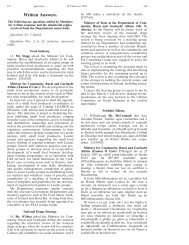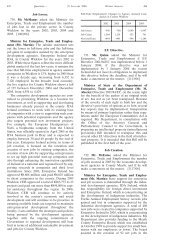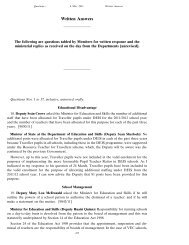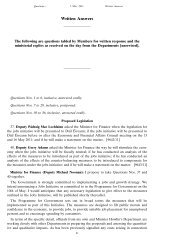Written Answers. - Parliamentary Debates - Houses of the Oireachtas
Written Answers. - Parliamentary Debates - Houses of the Oireachtas
Written Answers. - Parliamentary Debates - Houses of the Oireachtas
Create successful ePaper yourself
Turn your PDF publications into a flip-book with our unique Google optimized e-Paper software.
[Deputy Frances Fitzgerald.]<br />
Questions— 14 February 2012. <strong>Written</strong> <strong>Answers</strong><br />
Youth Justice Service have taken steps to ensure that children in care and detention are familiar<br />
with <strong>the</strong> work <strong>of</strong> Empowering People in Care (EPIC). This agency meets with and advocates<br />
for children in care.<br />
The Commission to Inquire Into Child Abuse made two key recommendations in relation<br />
to <strong>the</strong> voice <strong>of</strong> <strong>the</strong> child as follows. The first was that <strong>the</strong>y should be able to communicate<br />
concerns without fear and secondly that children who have been in child care facilities are in<br />
a good position to identify failings and deficiencies in <strong>the</strong> system, and should be consulted.<br />
The Commission to Inquire into Child Abuse 2009 Implementation Plan , commonly known<br />
as <strong>the</strong> Ryan Implementation Plan contains a series <strong>of</strong> measures, designed to ensure that children<br />
and young people have a stronger voice and are consulted.<br />
My Department led a major consultation exercise with children and young people in <strong>the</strong> care<br />
<strong>of</strong> <strong>the</strong> State over <strong>the</strong> course <strong>of</strong> 2010. Over 200 children and young people took part in consultation<br />
sessions. The aims and objectives <strong>of</strong> <strong>the</strong> consultations were to get <strong>the</strong> views <strong>of</strong> children<br />
and young people in <strong>the</strong> care <strong>of</strong> <strong>the</strong> State on <strong>the</strong> issues that really matter to <strong>the</strong>m and on which<br />
<strong>the</strong>y would like to be heard; to explore existing mechanisms for children and young people to<br />
express <strong>the</strong>ir views and to make recommendations on future structures to be established for<br />
children and young people to express <strong>the</strong>ir views. The Report, entitled “Listen To Our Voices”<br />
was launched by me last July.<br />
At <strong>the</strong> launch <strong>of</strong> <strong>the</strong> “Listen To Our Voices” last July, I indicated that I would be establishing<br />
a Voice <strong>of</strong> Children in Care Implementation Group to be facilitated by my Department. Its<br />
work and direction will be informed and influenced by children and young people. It is planned<br />
to establish <strong>the</strong> Group in <strong>the</strong> current year and my Department is currently working with <strong>the</strong><br />
HSE on this basis.<br />
70. Deputy Brian Stanley asked <strong>the</strong> Minister for Children and Youth Affairs <strong>the</strong> total number<br />
<strong>of</strong> young persons currently in receipt <strong>of</strong> after care services from <strong>the</strong> Health Service Executive;<br />
<strong>the</strong> number <strong>of</strong> aftercare workers employed by <strong>the</strong> HSE; and if she will make a statement on<br />
<strong>the</strong> matter. [8057/12]<br />
85. Deputy Ca<strong>the</strong>rine Murphy asked <strong>the</strong> Minister for Children and Youth Affairs if she will<br />
outline <strong>the</strong> current after care supports that are available for children and young persons who<br />
are leaving care; if she will provide figures for <strong>the</strong> proportion <strong>of</strong> said children and young<br />
persons who are provided with after care supports; her proposals on addressing shortcomings<br />
in this area; and if she will make a statement on <strong>the</strong> matter. [8082/12]<br />
Minister for Children and Youth Affairs (Deputy Frances Fitzgerald): I propose to take<br />
Questions Nos. 70 and 85 toge<strong>the</strong>r.<br />
Section 45 <strong>of</strong> <strong>the</strong> Child Care Act 1991 places a statutory duty on <strong>the</strong> HSE to form a view in<br />
relation to each person leaving care as to whe<strong>the</strong>r <strong>the</strong>re is a “need for assistance” and if it forms<br />
such a view, to provide services in accordance with <strong>the</strong> legislation and subject to resources. All<br />
young people who have had a care history with <strong>the</strong> HSE, be it foster care, residential care,<br />
high support, or special care are entitled to an aftercare service based on <strong>the</strong>ir assessed needs.<br />
The core eligible age range for aftercare is 18 years and up to 21 years. This can be extended<br />
until <strong>the</strong> completion <strong>of</strong> a course <strong>of</strong> education in which he/she is engaged up to <strong>the</strong> age <strong>of</strong> 23<br />
years <strong>of</strong> age.The HSE has not routinely collected national data in respect <strong>of</strong> children who leave<br />
<strong>the</strong> care <strong>of</strong> <strong>the</strong> state each year, <strong>the</strong>refore it is not possible to provide data on <strong>the</strong> proportion <strong>of</strong><br />
such children in receipt <strong>of</strong> aftercare. It is intended that implementation <strong>of</strong> a National Childcare<br />
Information System, which is due to go to tender this year, will provide for <strong>the</strong> routine collec-<br />
324











![[Deputy Michael Noonan.]](https://img.yumpu.com/30494839/1/190x245/deputy-michael-noonan.jpg?quality=85)




